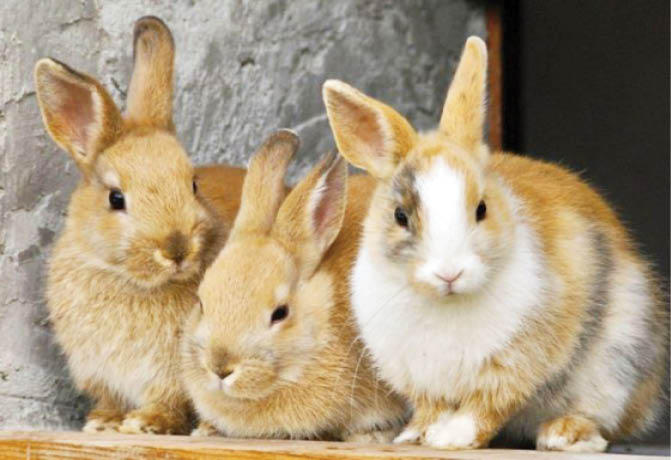Mr Taiwo Oje, a young man with a passion for rearing various kinds of animals, has also developed an interest in rabbit farming. But all he could raise were very few rabbits as he heard that although it is a profitable business, it requires lots of expertise to ensure success.
Rabbit farming, otherwise known as cuniculture, has gradually gained prominence in Nigeria over the years. At the moment, there are over 39,000 rabbit farmers in Nigeria, according to their Facebook profile.
- Five killed in fresh attack on Imo police headquarters
- After 9 years, Kano still awaits completion of 7.2mw power project
Many Nigerians are venturing into the business due to the profit attached to it.
According to Olatinwo Dayo of Aghub, an Ibadan-based company, getting a rabbit business off the ground and completed from start to finish would cost about N45,000 to N100,000.
According to Jerry, a Jos-based rabbit farmer, who has been in the business for three years, rabbit farming has a lot of turnovers. Every part of a rabbit is money for the farmer.
He said, “We sell the rabbit meat itself. An adult rabbit meat is sold at N1,200 per kg in my location. We sometimes sell N6,000 or N7,000 per adult rabbit, depending on what it weighs. Sometimes it is even more than that because we have had a rabbit that weighed 8kg. If we de-skin the rabbit, that is the fur or pelt, we sell it too as it is used in making hats and coats. The pelt is $20, which is about N9,000. We sell the urine of the rabbit, which sometimes goes for N250 to N500 per litre, and sometimes more, although it depends on your negotiating power. We sell 6kg of faeces for N3,000. At the end of the day, one rabbit can give above N20,000. Dog farmers buy rabbit bones for their dogs. Rabbit is like crude oil, there’s no need to dispose of anything.”
In Lagos, the price is not the same. A lecturer in the Department of Animal Production Technology, Lagos State Polytechnic (LASPOTECH), Dr Murisiku Onigemo, noted that in his location, people preferred oven-dried spiced rabbit meat as nobody wants to be involved in the killing and processing. While the oven-dried rabbit sells at N2,200 per kg, the fresh ones, on the other hand, are sold between N1,800 and N2,000 per kg.
Experts admitted that rabbit farming is more profitable due to their gestation period, which is between 28 and 30 days; and 33 days in some cases. The rabbit then gives birth (litters) up to eight, 10, 12, 15 or sometimes 18 kittens and wean them for six weeks or two months.
Jerry added, “Imagine someone with 10 doe (female rabbit) and each gives birth to 15 kittens each, that’s roughly 150 rabbits. Imagine selling each of them at N2,500 each, that’s profitable. The doe will give birth four, five or even six times in a year.”
What is the demand like?
There is a demand for rabbits and the market is huge, according to experts. In Jos, Jerry mentioned that he sold rabbits every week as people use it for many reasons.
“I have discovered that people use rabbits for pets, breeding. Students also buy two-month-old rabbits for an experiment in their labs.
“At a time, Shoprite wanted 1,000 rabbits in its Plateau State mall, but we couldn’t even give 200 in the whole of Plateau State. If there were 100 people who had 100 female rabbits, it would not still meet the demand.
“The Igbo from the southern part of Nigeria prefer rabbit for their bushmeat. I know someone who likes to buy up to 300, but we don’t usually meet the demand. So he had to buy from other parts of the country before he could get what he wanted,” Jerry said.
The case is not different in Lagos as 79 rabbit farmers in the Ibeshe axis of Ikorodu could not meet the demand as well. “In the Ikorodu community, the demand is more than the supply, so people tell us what they want by booking ahead,’’ Dr Onigemo said.
rabbit?
Jerry described the rabbit and what is special about eating it as very crunchy, and it takes less spice to prepare it. Health-wise, white meat is medically certified as having no cholesterol, gluten-free and has no haemoglobin. And it is whiter than any other livestock meat.
What rabbit farming entails?
According to Jerry, rabbit farming entails expertise and training as the rabbits are more delicate than any other livestock. The farmer noted that a good caging system and detailed training will be needed for a successful farming business.
It is advisable to go online to check modern rabbit cages to build. The Jos farmer explained, “A rabbit is not supposed to come in contact with its urine because it is so toxic that it can kill them. The cage must be made such that there’s a container that collects urine. When a good cage is built, it solves 70 per cent of the farmer’s problem. The most important thing in rabbit farming is a good cage, which must have a good water source system, a way to collect their urine and faeces.
“For someone who cannot meet the criteria of building a perfect system for them, it will be very difficult to raise them as they die so easily. A rabbit can stay without food but cannot stay without water. They can’t stay six hours without water. If they don’t have water in a day, they can all die.”
Just as a rabbit farmer needs good caging, training is very important. Without training, according to experts, nothing can be done. Jerry further emphasised that part of the reason to get trained is that when a dough gives birth and the farmer touches the kittens with bare hands, the dough will not breastfeed such kittens. The farmer may just keep losing rabbits without knowing why.
“A farmer may leave them all day without providing water for them and return only to see them all dead. They have parasites that will make them lose their hair. Bitter leaves are a good antibiotic. Their health monitoring is very important because if a rabbit is sick, it stays in one place, and if it is healthy, someone cannot even hold it as it moves fast.
“There are dozens of reasons to go for training before opting for rabbit farming, if not, the farmer will just keep losing rabbits without knowing why. Get trained and have a good cage, then the sky will be your starting point as a rabbit farmer and it will be the most profitable thing you will ever delve in,” he added.
In his contribution, Dr Onigemo said rabbit farmers should give extra care to their rabbits. Once a doe gives birth, the kittens need special care as they are blind, and they have no hair on their bodies. If the mother is disturbed, the baby will be abandoned.
Breeding the rabbit?
When a baby rabbit (kit) is littered (given birth to) by the doe, it takes two months to wean it and another two months to grow and be mature. On average, it takes four months to breed a rabbit. Dr Onigemo explained that the rabbit that grows for three to four months before being sold off is called a fryer and it is usually available due to the short breeding period. The fryer’s meat is as tender as that of a broiler chicken, such that one can actually eat both the meat and the bones. Adults whose teeth are not so strongly prefer it.
However, not all rabbits take a short time. An adult male rabbit takes six months to properly mature before being sold off, while a female rabbit could be with the farmer for three to four years before being sold off as they are no longer productive at that time.
Feed
JF Rabbits, a Nigerian company with over six years of experience in rabbit farming suggested that rabbits feed on green plants and root crops. Green plants and root crops contain protein, minerals and vitamins; they are almost 90 per cent water. Rabbits also like sweet potatoes, carrots, sugar beets, turnips and white potatoes. These contents make them very important food for rabbits.
Lamenting on the absence of rabbit feed meals, Dr Onigemo complained, “Most feed millers are not producing feed for rabbits, so farmers have to formulate themselves or look for pellets. I pellet myself. When I had an engagement and couldn’t pellet myself, I bought it and it was not as nutritious as the one I produce. Feed millers stopped producing at a point because people are no longer going into rabbit production.”
Rabbit farming, the experts suggested, can be done indoors or outdoor as rabbits can be reared as pets or in a small space as they are friendly and can be trained by children or adults.

 Join Daily Trust WhatsApp Community For Quick Access To News and Happenings Around You.
Join Daily Trust WhatsApp Community For Quick Access To News and Happenings Around You.


